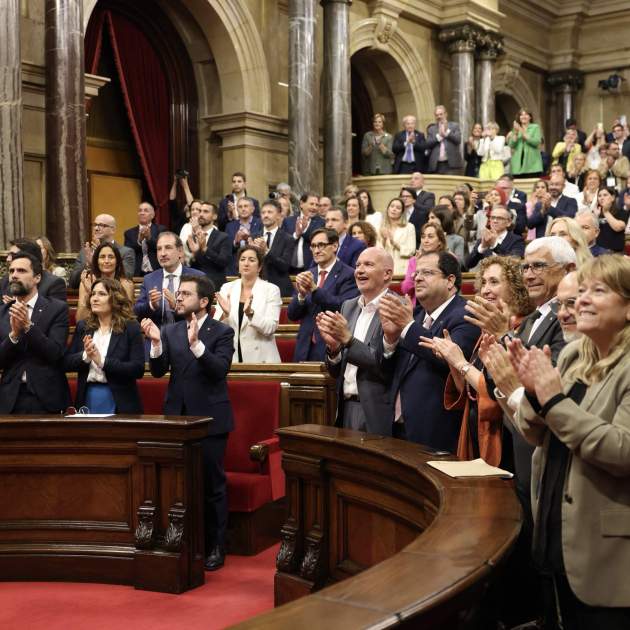An agreement in the Catalan Parliament that is both significant and broad. The Catalan Socialists (PSC), Together for Catalonia (Junts), the Republican Left (ERC), the Comuns and the CUP have agreed on a proposal to amend the chamber's regulations to incorporate electronic voting, expand the basis for delegating one's vote and bring the rules on the formation of parliamentary groups close to those of Spain's Congress of Deputies which will allow the CUP to have its own group and not have to share the Mixed Group with the Catalan Alliance. The five parties registered the proposed reform of the regulations this Friday and it represents a paradigm shift: after the Constitutional Court on several occasions refused to admit the modality of telematic voting for MPs in exile, the intention now is that the rules of Parliament will incorporate it in order to protect the rights of parliamentarians who are still outside Catalonia. In fact, it is a form of voting that regulations such as those of Congress already contemplate.
In addition, the proposal has been registered with the request that it be processed under a single-reading procedure so that it could be passed and come into force this July. That would mean that telematic voting could already be underway in a possible vote for the investiture of a Catalan president. The inclusion of this method of voting also implies a change in the position of the Socialists: while in the previous legislature they went to the Constitutional Court with a complaint on the telematic vote that the Bureau had granted Lluís Puig, now the party is in alliance with four other parties on the inclusion of this voting method in the rules of Parliament.
The rule changes
To allow telematic voting, the proposal seeks to include a new article in Parliament's regulations that authorize this modality and the delegation of the vote "in exceptional situations duly justified at the discretion of the Bureau in which, to prevent the development of the parliamentary function and given the special circumstances, it is considered sufficiently justified". It is also a voting regime that will be considered for "deputies who have commitments to represent the Parliament of Catalonia or the Generalitat de Catalunya abroad, when participation in official activities prevents them from attending voting in a plenary session". So what does an MP do if they need to vote through this procedure? According to the text agreed between the PSC, Junts, ERC, Comuns and the CUP, they "will have to request it through a letter of justification to the Bureau, which will communicate its decision specifying the period of time in which it can issue the vote through the aforementioned procedure". This agreement makes it possible to recover part of the reform of the parliamentary regulations that ERC and the CUP agreed on during the last legislature over the inclusion of electronic voting.
Protecting the ability to vote of Puigdemont, Puig and Wagensberg
With the aim of guaranteeing the right to vote of the deputies who are in exile, the agreement includes a transitory provision that links the telematic vote to the approval of the amnesty law: "The deputies who are within the cases included in Law 1/2024, of June 10th, on an Amnesty for Institutional, Political and Social Normalization in Catalonia, may delegate their vote in accordance with the procedure provided for in the regulations of the Parliament of Catalonia in order to guarantee their performance of their parliamentary functions", a provision that will remain in force "as long as there is any legal procedure open on how this law is to be applied in the cases that affect the deputies either in the Constitutional Court, the European Court of Justice or the European Court of Human Rights". In regard to this, it should be remembered that, at Parliament's constituent session, the Age Committee had to authorize the delegation of the votes of Carles Puigdemont, Lluís Puig and Ruben Wagensberg and the People's Party appealed that decision to the Constitutional Court. With the reform of the regulations, which will pass with the support of 107 out of the 135 MPs, these voting systems will be more formally guaranteed.
The CUP could obtain its own group
The results of the Catalan election on May 12th left the radical-left, pro-independence CUP in a weaker situation: the party fell from 9 to 4 deputies and, with the reduced number of parliamentarians it now has, it has not been able to form its own group. This has meant that the anti-capitalists have to share space on the mixed group with the far-right Catalan Alliance, an option that they have sought to avoid over the last few weeks and that they have been negotiating until achieving this rule change, which will allow them to 'emancipate' themselves from the Islamophobic party. The mechanism agreed is that "the change of membership from one parliamentary group to another, with the exception of membership in the Mixed Group, can only be carried out in the first five days of each session period". Thus, the reformed regulations would allow another party to temporarily transfer one of its deputies to the CUP so that they could form their own group at the start of a new period of sessions.
Finally, the reform proposes changes in institutional declarations, a point of friction in the last legislature because, without the quorum of all the groups, none of them could prosper. That is why it is proposed to replace the current requirement of unanimity with a qualified majority of two-thirds of the Party Committee in order to give the green light to an institutional declaration by Parliament. Those declarations that come from the Party Spokespersons Committee will still be approved by majority.
